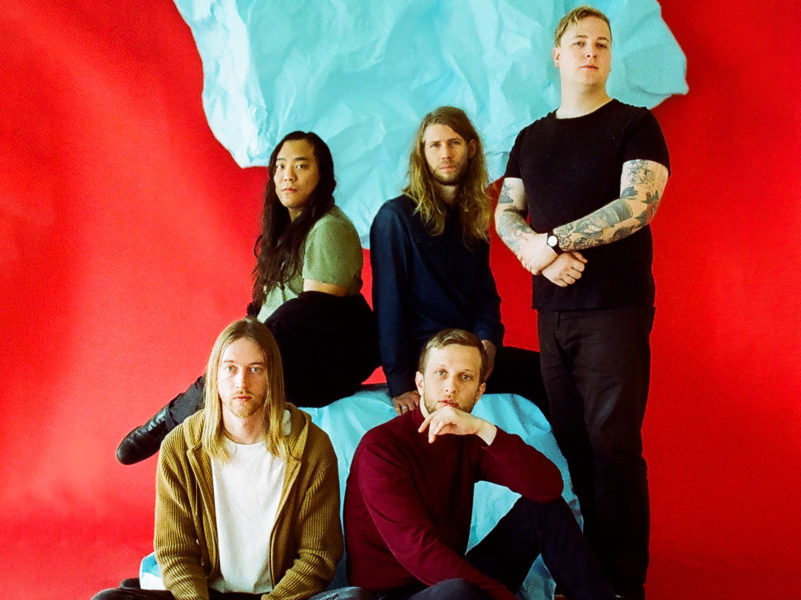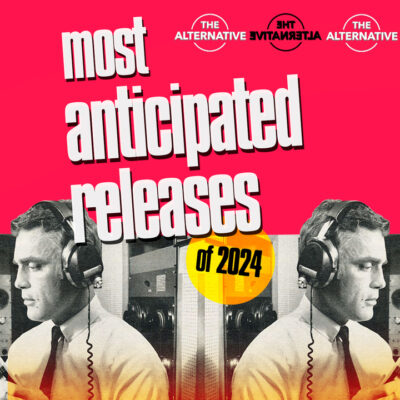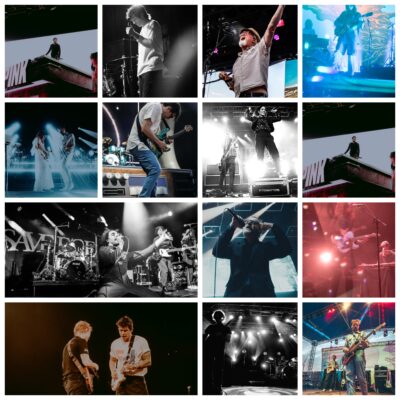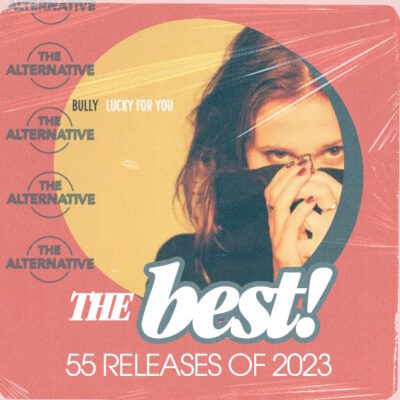Interview: La Dispute On Their New Record ‘Panorama’
Posted: by The Editor

It wouldn’t be an overstatement to call La Dispute one of the most important post-hardcore bands of the 21st century—their early LPs Somewhere at the Bottom of the River Between Vega and Altair and Wildlife are (rightly) considered classics and cited by countless newer bands as influences. The only thing is it might not be accurate to call the Grand Rapids, MI, five-piece a “post-hardcore band” anymore. 2014’s Rooms of the House displayed a newfound restraint, pulling back to allow the band to explore atmosphere in a way they never had before. Their latest, Panorama, finds them again channeling their more aggressive side while retaining the more textured sounds of Rooms. This places an all-new emphasis on Jordan Dreyer’s lyrics—and, as any La Dispute fan knows, his lyrics are a big part of their appeal. I recently spoke to Dreyer about Panorama.
The Alternative: It’s been five years since Rooms of the House. What’s La Dispute been up to in that time?
Jordan Dreyer: We took some time off for a long while, maybe the longest period of inactivity in our history. It was necessary, I think. We all needed some time with our families to recuperate at home. So we took some time off. We all live different places too, that’s probably relevant. Everyone was kind of on their own little island. Then we reconvened, all of us, in Grand Rapids in spring 2017 to write Panorama. It’s been a long process, end of April or May of 2017 to March 2019. A lot of that time was spent writing and a lot of it was back and forth at the studio. Basically just a lot of working over the past two years.
Yeah, that sounds intense.
It was a little overwhelming at times. [laughs]
Was that very different from the record processes for your last couple records?
Yes and no. We’ve always had sort of aspirational plans when making records to varying degrees of success, so it’s not terribly uncommon that we have had to double back and book more time when we didn’t finish in time for our original deadlines. Living in different places definitely complicates things, though, so this was definitely a more exaggerated version of the process that made Rooms. So not brand new, but a notch or two above what it’s been in the past.
As far as I understand, this is your first album with fully autobiographical lyrics, right?
Ish. The last record we did pretty much entirely fiction. Wildlife was a little of both, and the one before that was largely autobiographical with touches of fiction and other people’s stories. I would say this is the most consistently autobiographical of any.
Was this a lot different than trying to write almost exclusively autobiographically as opposed to weaving that in with fiction?
Yeah, I think when we started I underestimated how difficult this would be. It’s a whole different thing. I don’t think it’s a conscious decision necessarily when using an allegory to talk about yourself to obscure the subject matter in your own defense, but there is a degree to which it leaves you less exposed. I think that there were more moments of self-awareness in this process when I thought, “Oh shit, people are gonna hear this.” That made me an even heavier editor than I already am. I think it was difficult at times in a way that in the past it wasn’t as much.
That is interesting to hear just knowing how intimate some of the songs on your past records were, even if they weren’t necessarily your stories or experiences.
I think it comes from, when you’re talking about someone else’s experience, there’s a concern for the content that if I were telling my own story, I’d be less wary pointing a finger or suggesting a moral reaction to a story. When you’re talking about someone else’s story, you try to be as true to their experience as possible. For me, it’s always been trying to be as empathetic as possible. It’s always been important to me to be careful with other people’s stories.
As I understand, Panorama is about the drive into Michigan and the things you see on the way and the events that took place on the way there.
Yeah.
Reading the lyrics, that narrative all makes sense. I was unsure about the song “There You Are,” though. It seemed less like a song about a moment and more a song about a feeling if that makes sense.
I think you’re nailing it. Like you said, the record largely takes place in the course of a drive from Grand Rapids to another city just outside called Lowell, and more or less it follows that physical drive and the stories and how they connect to the characters in the vehicle making the drive. For the most part that plays out across the record. In my head, though, there are two things going on: the events and how they connect to myself and, more specifically, my partner who grew up in the area and is more directly connected to that area and those traumas – there’s the connection to those tragedies and her and her community and how they reverberate through her life – and there’s my connection to her, and how to be a better partner, often in regards to that trauma, but not exclusively. Also just trying to find a way to be helpful, a contributor, productive member of your relationship, community, whatever.
“There You Are” was meant to be the culmination of that aspect of it, the less tangible part, more about me and self-assessing my failures in the face of trauma. It doesn’t connect to the story as much as the others on the record, it’s more of a self-assessment and a promise for the future. It’s the most intangible, most feeling-based on the record.
Reminds me a lot of the position that “all our bruised bodies” had on Wildlife, right before the closer how it ties everything together before moving into the conclusion.
Yep, it’s the exact same format. That record is two competing linear narratives – responses to death, finding a purpose – that take place in a specific pocket of Grand Rapids and the narrator’s reactions and that ends at “all our bruised bodies” before the end of the record.
So do lay out your records as narratives, then? Like, did you say, “Okay, ‘Fulton Street I’ is the opener, and ‘You Ascendant’ is the closer?”
Well, Wildlife we laid out beginning to end. We had a very specific idea thematically and conceptually. This time around I had an idea of what I wanted to do conceptually but that quickly became apparent it wasn’t gonna work that way. Too many ideas and I couldn’t connect this thing to that thing. The solution was eventually to focus less on making things fit and building around it and more into letting my bandmates move instinctually and write and let that dictate what I keep. This, more than past records, was made sort of piece by piece. There are aspects of the original plan. We definitely knew “Fulton Street” would be the beginning and “You Ascendant” would be the end but everything in between – even the exact subject matter beyond “Fulton Street” – was more organic – which was fun. Eventually I just stopped trying to figure it out beforehand and just let it happen naturally. That’s never been how I’ve operated.
I’ve always introduced restrictions to sound different than before but on this one, on a lyrical level – and, I think my bandmates would say, on a musical level – the restrictions came up naturally in the timeframe we had. I think that became the thing that pushed us in a new direction. That was fun. Not sure that’s the right word, but it was exciting to see the way it happened.
Would you say this was a more spontaneous process then?
Yeah, yeah. We wrote for two months, then decided collectively – well, we came to this conclusion each on our own while starting to write – this wasn’t really working. We scrapped it all and started over, instead of writing in everyone’s own little space, and everybody moved their shit into the same room. Then – and this is funny – I left, I had to run some errands, and when I came back they’d written a song. That was the thing that sparked the record after two months of slamming our heads into the wall. For fucking two months we got nowhere, then we had an honest assessment of the state of affairs, of where we wanted to go, then they sat down and wrote a song in, like, two hours. When they played it for me it was like, “Holy fuck, we should’ve been doing this since day one.” There’s a balance between being analytical and making calculated decisions, and there’s still a ton of that, but to build that framework we had to take ourselves out of the process and just work how we did when we were starting. All the analytical tinkering could happen after we built the canvas. Then when we were in the studio it was just like, “Let’s try this, let’s put a trumpet here, let’s try this synth wash.” It was different, but it was fun. The moment we remembered it was supposed to be fun was when everything changed.
“Rhodonite and Grief,” with the horns, is definitely super different for you. But it might actually be my favorite on the record.
Oh, thank you. Yeah, that’s a perfect example. That’s a song where we just wanted to try textures and layers and do something unconventional. I don’t think we would’ve gotten to that point without struggling.
Are there any other songs you particularly want to highlight?
I really like the last track. I think it’s very different for us. My bandmates did a lot of really cool studio tricks. When that song was written it was a demo that Chad, our guitar player, had written and chopped up – it was actually two songs, this one and “Anxiety Panorama” – where he took an existing demo and he took Brad’s drums and chopped them up and used Brad’s parts to make his own digitized drum sounds, then Brad took those digitized parts and re-recorded them and there’s a lot of studio stuff that’s so far above my pay-grade to understand [laughs] but when you can sit down and listen to those on headphones or with good speakers, you can hear those layers. That attention to detail comes through and you don’t hear that as much on some of the heavier songs but a song like “Rhodonite” or “You Ascendant,” you can hear the way my bandmates really pushed themselves.
I think your Pilgrimage game idea was really cool and unique – how did you come up with that?
I’m not the best person to be the video game historian, because that was mostly our bass player Adam and our manager Kirk. For the first time, we had a budget for videos, and we wanted to work with animators. That was a decision we made early on. We wanted to pick three different animators with three different styles and let them run with it with little direction. One of the people we picked was a Dutch dude, Joost Eggermont, who does all video game style animation. We approached him and somewhere along the line it turned from a video idea to a video game idea. Not sure whose idea it was, maybe Joost’s. It was a lot of back and forth between him and the band with prototypes. You want to provide a creative way to introduce people to the record, which was down, but you want it to be interesting on its own too. There was a lot of tinkering with the format.
It’s weird, I feel like since Bjork did the app thing people’ve been talking about changing how we consume albums. Beyonce did Lemonade, a video experience. It’s been interesting how it hasn’t really taken over – maybe it will. To me, though, art is more interesting when it can be digested in multiple ways and my favorite albums are the ones I can dig into and find new things on sonic and lyrical levels. It’s been cool to see more bands doing more elaborate rollouts, making their music something that can be experienced on multiple levels. There’s a degree of collaboration that comes with it too, which was maybe the most fulfilling part. You get to let people in and give them a platform and see the phenomenal things they’re capable of. It’s been cool.
You sort of touched on the artwork for this album, but it’s super different from your other albums, and I was wondering about that.
Adam, our bassist, is the point-man for all things visual. He did the art for our last two records, so this time he wanted to outsource. On his end it was partly a way to add restriction. When you’re doing artwork you have this scope and there’s only so much you can see from your side but someone else will have a totally different set of tools. When we were first writing, when we first started over, he brought a bunch of images into the practice space and pasted them onto our whiteboard, and a lot of them were that artist, Victor. So when we were talking about potential artists to hire, that was what stuck out to us. I know he had a style guide, a bunch of reference points; he made a very thorough reference page to send to Victor when it came time to make the record, so that was his general feel and concept given to an artist we were already familiar with. And it’s cool, because it’s so different. It was really startling. Adam and I would talk about it, but then to see it in color the first time was startling. It was just so dramatically different from anything we’d ever done, which was kind of exactly what we hoped for, to feel a little startled on viewing. But I do think it fits very directly with the aura we were going for.
This is how I like to end every interview, especially when it’s someone who’s put out three or four records. If you could go back to the Jordan who was writing Vancouver or Somewhere at the Bottom, and you played him Panorama how do you think he’d react?
On every level, and maybe this is too easy, musically I think I’d be proud of my bandmates and also simultaneously not surprised. I think for a long time I’ve known how talented they are. To see that transformation occur I would be proud, but I’d also be like, “Yeah, of course.” On my level, there’s two things. One, when we started making music, I didn’t know how to do anything. [laughs] Like, I didn’t know how to sing – I still don’t know how to sing. But I think I’d be proud of my progression as a musician, truthfully. So there’s that. But I also think I’d be proud that I’m at a point in my life where I can look at my life with a degree of perspective. When we were first starting we were young, and everything felt like life or death. I’m proud I can look at my life in a measured way, panic less, worry less, while not dismissing those parts of myself. I don’t think I’ve done that either.
—
Zac Djamoos | @greatwhitebison
The Alternative is ad-free and 100% supported by our readers. If you’d like to help us produce more content and promote more great new music, please consider donating to our Patreon page, which also allows you to receive sweet perks like free albums and The Alternative merch.










